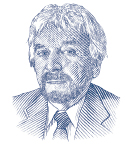
David Irwin, PhD
Victoria was a 79-year-old woman living alone in a London suburb. Having no children of her own, she visited us regularly here in the United States. She was one of three sisters and my sister-in-law. I knew her for more than 50 years, and she always reminded me of Audrey Hepburn, both in looks and in demeanor. She even sounded very much like the star with her regal accent.
We recently attended her funeral remotely—the service was streamed live from the old church she attended close to her apartment. COVID-19 prevented our travel to London to visit her while she was briefly sick, to be there when she died, or to attend her funeral physically. Her family relatives watched on their computers in real time, in different parts of the United States as wellas in the UK.
The service in the old church was very moving. About 30 people were allowed to attend, but under current UK rules, they were not allowed to sing. Instead, the church played recordings of hymns and psalms sung by the choir of Trinity College, Cambridge University: a choir founded in the 14th century. They were magnificent.
Diagnosis of Metastatic Lung Cancer
Victoria led a normally healthy lifestyle—good nutrition, regular walks and pilates, and lots of travel. However, she had a life-long, nagging, mild asthma problem and took low-dose methotrexate to control arthritis in her hands and wrists. She never smoked. In late summer, she developed a cough, which was treated with steroids by her regular doctor. As the cough persisted, and she began to have some difficulty breathing, she was referred for routine chest imaging.
The x-rays revealed an empyema and pleural effusion in her lower right lung. She had elevated inflammatory markers, with C-reactive protein levels of between 200 and 300 mg/L, a white blood cell count of between 15,000 and 20,000/mm3, and periods of elevated temperature. A pleural catheter was inserted to drain fluid and ease her breathing. Liters of fluid were drained over the next few weeks.
A course of intravenous co-amoxiclav [also known as amoxicillin/clavulanic acid] followed by treatment with piperacillin/tazobactam failed to reduce the inflammatory markers or elevated temperatures. Moreover, cultures of urine, blood, and pleural drainage revealed no bacterial infections. Biopsy of a pulmonary mass revealed non–small cell lung cancer, later confirmed to be adenocarcinoma, along with spread to N2 lymph nodes. She quickly developed extensive metastases locally and was staged at T4N2M1a. She never exhibited hemoptysis but was in considerable pain in her shoulders, which was managed with morphine sulfate as needed.
We discussed with her doctors about moving Vicky up to a hospice care facility in North Yorkshire, to be closer to her youngest sister living in the North, but we ran out of time. She passed quietly early in the morning exactly 7 weeks after she entered the hospital for routine x-rays.
Coronavirus Complicates Final Days
Looking back, I am struck by how extensive the effects of COVID-19 have been on our lives. The impact is not limited to just the families of the more than 16 million people infected in the United States, but also to the thousands trying to find emergency care for other conditions, only to find the nearest hospitals unable to take them. The effects on patients with cancer requiring surgeries and other interventions that had to be delayed may never be fully appreciated.
Patients without COVID-19 such as Vicky cannot receive visitors without close family members imploring hospital staff and gowning up if they are allowed in. They did allow in the reverend from her church, to whom we will always be deeply grateful. Vicky’s youngest sister was able to get in to visit her just once, 2 days before she died, and we were able to speak with her by telephone just hours before she passed.
Sincere thanks are due, too, to the hospital nursing staff, with their infinite patience when dozens of Vicky’s friends plus her two sisters and I telephoned to check on her every few days. Hearing the ward nurses’ cheerful voices was like stepping into an episode of the BBC drama series Call the Midwife. Across the world, they are modern day Florence Nightingales.
“The effects [of COVID-19] on patients with cancer requiring surgeries and other interventions that had to be delayed may never be fully appreciated.”— David Irwin, PhD
Tweet this quote
I feel badly for the consultants at the hospital facing an impossible task such as in Vicky’s case. I communicated by e-mail and telephone with all six of them (in this NHS hospital, they rotate consultants every 7 days; in her seventh week, I was back in touch with the consultant she had when she was initially diagnosed). I am impressed that they took the time to let me know how things were going, sometimes late into the night, Eastern Pond time.
It seems more evident today that smoking is far from the only risk factor for lung cancer. Increasingly, we see inflammation (for example, in joggers, particularly in the cities), autoimmune conditions, and asthma present significant cancer risk as well. Certainly, second-hand smoke may be much more important than most of us realize. For sure in Vicky’s case, she spent her childhood years in a very smoky home.
DISCLOSURE: Dr. Irwin reported no conflicts of interest.
Dr. Irwin is Former Associate Director of Lombardi Comprehensive Cancer Center (ret’d) and Acting Vice President for Clinical Trials, St. Jude Children’s Research Hospital (ret’d).

